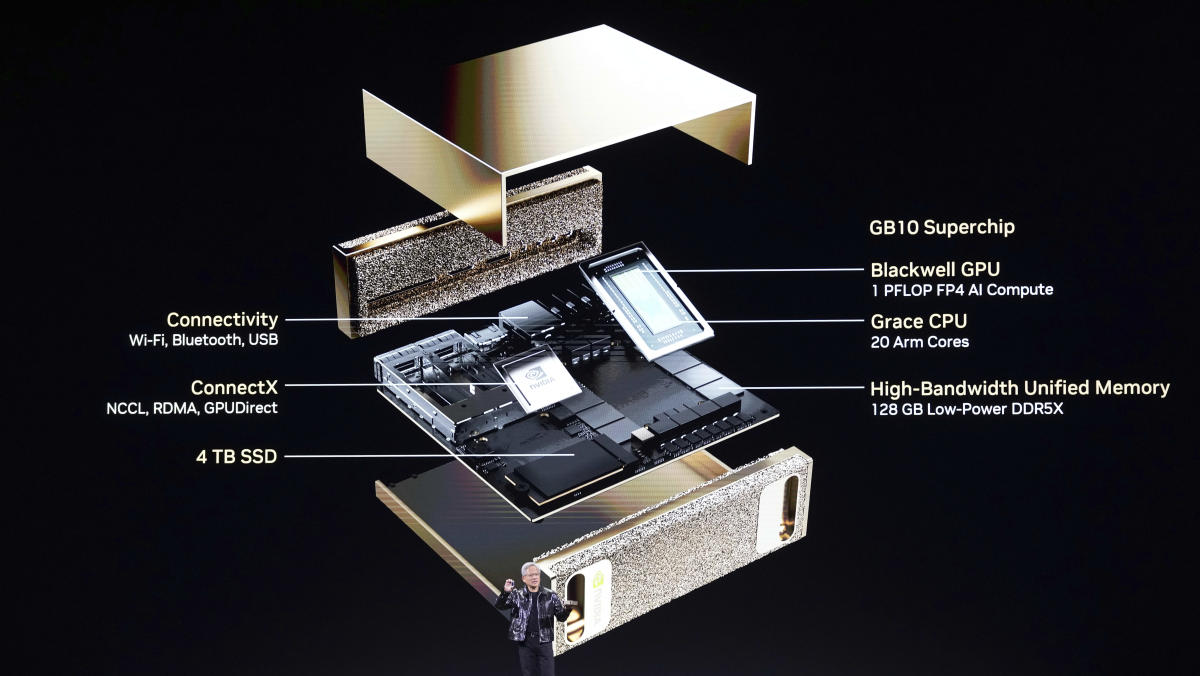Nvidia’s ‘Project Digits’: A Glimpse into the Future of AI at CES 2025
At the highly anticipated CES 2025, Nvidia’s CEO Jensen Huang took to the stage to unveil the revolutionary Project Digits, an AI supercomputer that promises to reshape the technological landscape. This groundbreaking initiative ignited excitement across various sectors, showcasing potential applications that could redefine industries ranging from healthcare to entertainment. With its advanced capabilities, Project Digits is poised to elevate artificial intelligence to unprecedented heights.
Understanding Project Digits
Project Digits is more than just another AI system; it’s a sophisticated supercomputer designed to implement artificial intelligence at a scale never before seen. Designed to seamlessly integrate with existing infrastructure, this supercomputer aims to enhance processing power, data analysis, and machine learning capabilities. But what sets it apart from its predecessors?
- Architecture: The architecture of Project Digits is based on Nvidia’s state-of-the-art GPUs, optimized for AI tasks. This means faster processing times and the ability to handle massive datasets with ease.
- Scalability: One of the standout features of Project Digits is its scalability. Whether used by small startups or large enterprises, it can adapt to different needs and workloads.
- Interconnectivity: Designed for the modern digital ecosystem, Project Digits is built for interconnectivity, allowing for seamless integration with cloud services and existing data systems.
Potential Applications of Project Digits
The implications of Project Digits are vast, with potential applications across numerous fields:
- Healthcare: Imagine AI systems capable of analyzing patient data in real-time, identifying patterns that could lead to early diagnoses or personalized treatment plans. Project Digits could facilitate this groundbreaking approach, transforming patient care.
- Finance: In the finance sector, Project Digits could revolutionize risk assessment and fraud detection through advanced predictive analytics.
- Entertainment: The gaming industry could see a leap forward with AI-driven game design and improved graphics rendering, offering players an immersive experience powered by Project Digits.
The Impact on Industry and Society
The introduction of Project Digits raises important questions about the future of work and the role of AI in society. As industries adapt to harness the power of this technology, we may witness significant shifts in job functions, particularly in sectors heavily reliant on data analysis and processing.
While some may fear job displacement, others argue that Project Digits and similar technologies will create new opportunities. For instance, as businesses adopt AI solutions, there will be a growing demand for professionals skilled in managing and interpreting AI outputs.
Jensen Huang’s Vision for AI
During his keynote, Jensen Huang highlighted the importance of responsible AI development. He stressed that as we advance towards a more AI-integrated future, ethical considerations must remain at the forefront. The launch of Project Digits is not just about technological advancement; it’s also about ensuring that AI is developed with a focus on enhancing human capabilities rather than replacing them.
Huang’s vision includes fostering a collaborative environment where AI can complement human intelligence. This symbiotic relationship could lead to unprecedented levels of creativity and innovation across various fields.
The Role of Education in AI Development
As we embrace the era of Project Digits, education will play a crucial role in preparing the workforce for the future. Educational institutions will need to evolve their curricula to include AI literacy, machine learning, and data science, ensuring that students are equipped with the skills necessary to thrive in an AI-driven world.
Moreover, initiatives focused on upskilling current professionals will be essential. Companies must invest in training programs that empower employees to work alongside AI technologies, thereby maximizing productivity and fostering a culture of innovation.
Challenges and Considerations
Despite the excitement surrounding Project Digits, challenges remain. The implementation of AI technologies often raises concerns about data privacy, security, and bias in algorithms. As businesses and governments explore the capabilities of Project Digits, addressing these issues will be paramount.
Additionally, regulations surrounding AI technologies are still developing. Stakeholders will need to collaborate to establish ethical guidelines and standards that govern the use of AI, ensuring that advancements do not come at the expense of public trust or safety.
A Look Ahead: The Future of AI
The launch of Project Digits at CES 2025 marks a significant milestone in the trajectory of artificial intelligence. As we look to the future, the potential applications and benefits of this technology are boundless. With proper oversight and a commitment to ethical practices, Project Digits could pave the way for a new era of innovation that enhances human life and productivity.
As industries begin to integrate this powerful AI supercomputer into their daily operations, we can expect to see a wave of innovations that will change how we live, work, and interact with technology. From smarter cities to more efficient healthcare systems, Project Digits is set to be a catalyst for transformation that extends far beyond the tech sector.
In conclusion, Nvidia’s Project Digits represents not just an advancement in technology, but a fundamental change in how we perceive and interact with artificial intelligence. Its unveiling at CES 2025 offers a tantalizing glimpse into a future where AI is deeply embedded in our lives, promising to unlock new possibilities and enhance our capabilities in ways we are only beginning to imagine.
See more Future Tech Daily

